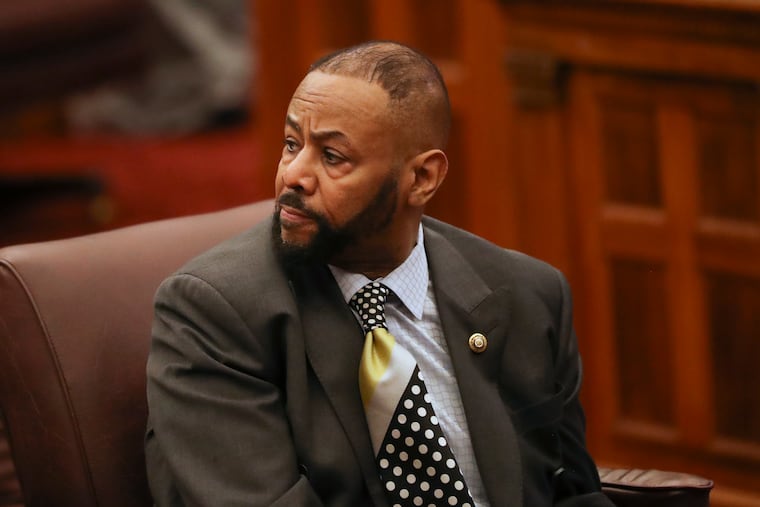Councilmember Curtis Jones is working to block a drug rehab center proposed in Wynnefield Heights
Councilmember Jones introduced legislation in an attempt to frustrate plans to build a 300-bed drug and alcohol rehabilitation facility in his district.

Councilmember Curtis Jones Jr. introduced a zoning overlay bill on Thursday that targets a small corner of West Philadelphia’s Wynnefield Heights neighborhood.
The bill bans medical, dental, health or hospital uses from the area around 3905 Ford Rd., the site of a proposed 300-bed inpatient alcohol and drug rehabilitation facility. Previously the building was the West Park Hospital and then Wordsworth Academy, a residential treatment center for boys with severe behavioral issues.
“The reason is the average property value up there is upward of $300,000,” said Jones, when asked why he introduced the legislation. The neighborhood is full of lawyers, doctors, judges, and retired politicians, he noted.
Jones said a rehab facility would attract drug dealers to the nearby park in hopes of luring inhabitants of the proposed facility.
“I’m not an assessor, but I would imagine if you were to go with that use, you would have every drug dealer from here to Kensington waiting for the rehabbed person to graduate,” Jones said. “ ‘Congratulations on your rehab, come down to the park, I got a free sample for you.’ With that comes all kinds of other things I don’t want to wish upon that community.”
Critics of Jones’ bill say that using land use regulations to forestall treatment sites will harm Philadelphia’s most vulnerable residents and potentially drive these kinds of facilities to less accessible locations.
“Substance use treatment is critical for improving community health and is key to preventing overdose,” said Alexis Roth, associate professor of community health at Drexel University. “While the use of zoning laws to prohibit establishing treatment services in a particular jurisdiction may appear to be class and race neutral, the effects are not.”
The developer, BG Capital, already has two building permits for the property with total improvements listed at over $15 million. It was sold in mid-2022 for $10.75 million.
But Jones says that BG Capital hasn’t received the necessary licensing for the rehab facility from the state and that it will be difficult to finish the project given opposition from City Hall and the neighborhood’s Harrisburg representatives.
“They never even put an application in at the city or at the state,” Jones said. “Sen. [Vincent] Hughes, the mayor’s administration, they are all looking at this. So the likelihood of it happening is diminished.”
He said his office is trying to convince the developer to open a teaching hospital instead. Negotiations are ongoing, but he is hopeful a non-rehab use will be found.
“The property owner and our team are working collaboratively with the councilman’s office, the state senator’s office, and community stakeholders to provide a project that benefits everyone,” said Rachael Pritzker, the zoning lawyer representing BG Capital. “We appreciate the continued leadership, coordination and efforts from everyone involved.”
Jones said BG Capital began renovating the building for the rehab facility without talking to him or local community groups.
“Once the community found out, all hell broke loose,” he said. “Ergo, this legislation.”
Jones introduced an earlier bill that sought to ban rehab facilities from this corner of the neighborhood, but he was advised that such a law would be unconstitutional. That’s why the current bill would instead ban all medical uses.
Similar bans on medical offices were enacted by Councilmembers Bobby Henon and Brian J. O’Neill across large swathes of their districts in the Northeast in 2013 in an attempt to block methadone clinics from being established.
Jones’ bill is part of a larger pushback in city government against harm reduction and rehabilitation programs.
Last year, City Council created an overlay to block supervised drug use sites from most of the city. Councilmember Quetcy Lozada urged a landlord to not renew the lease of the harm reduction nonprofit Savage Sisters and said she had “serious concerns” about Prevention Point, the oldest syringe exchange program in the city. Then Mayor Cherelle L. Parker stripped municipal funding from the city’s syringe exchange programs.
Critics argue that this kind of oppositional policy-making is counterproductive in a city ravaged by substance abuse issues and where opioids have taken an especially deadly toll: 6,500 people have died of overdoses in the last five years.
The facility proposed for 3905 Ford Rd. was of a kind that’s often less controversial. It was meant to be an inpatient practice, meaning that people would be staying there to get sober — not receiving treatment and leaving as they might at a methadone clinic or another type of outpatient practice.
“In a city where overdose rates continue unchecked, any policy limiting treatment access makes no sense,” said Roth, of Drexel University. “Given treatment rates are lowest among communities of color and overdose rates are highest among our Black residents, [now is] the time to establish treatment facilities in West Philadelphia where overdoses are disproportionately high.”
Jones said that changing the zoning would mean that any future proposal would have to go through the city’s Zoning Board of Adjustment for approval, which necessitates a meeting with the community first. It would also add uncertainty that could discourage development of this kind.
Tweaking the zoning of a particular plot of land to frustrate a specific development — so-called spot zoning — has been determined to be illegal in some cases.
“Some would call it spot zoning,” Jones said. “I call it preventative by-right [zoning].”